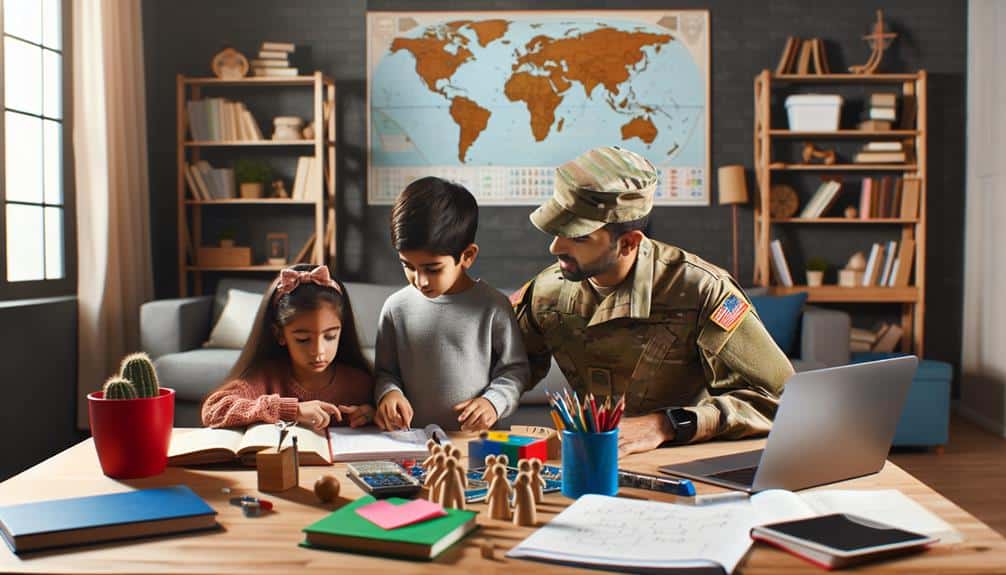Managing homeschooling in rural areas as a military family can be challenging but rewarding. Establish a daily routine for stability. Use online resources like virtual field trips for interactive learning. Engage in community activities for support. Adapt to new locations and incorporate military life into lessons. Embrace block scheduling for efficient time management. Foster independence in learning and balance family and school responsibilities. Seize unique opportunities for enrichment. These tips can help you tailor your homeschooling approach to fit your nomadic lifestyle.
Key Points
- Join local homeschooling co-ops for support and resources.
- Utilize online resources for consistent education.
- Embrace local area for engaging field trip opportunities.
- Stay flexible and resilient during frequent moves.
- Incorporate military history and values into lessons.
Establishing a Routine
To guarantee a smooth homeschooling experience for your military family, start by establishing a consistent daily routine. Setting a predictable schedule can provide stability during times of change and uncertainty.
Begin each day with a structured morning routine that includes breakfast, getting dressed, and gathering necessary materials for the day's lessons. Designate specific time blocks for different subjects, breaks, and physical activity to keep the day organized and engaging.
Incorporate flexibility into your routine to accommodate unexpected military obligations or family needs. Consider creating a visual schedule or checklist to help children independently navigate their daily tasks.
Regularly review and adjust your routine as needed to make sure it continues to meet your family's evolving needs.
Utilizing Online Resources
You can enhance your homeschooling experience by incorporating virtual field trips and interactive learning platforms into your curriculum.
These online resources provide a dynamic way to explore different subjects and engage with educational material in a fun and interactive manner.
Virtual Field Trips
Explore the world from the comfort of your home by taking advantage of virtual field trips available through online resources. Virtual field trips offer an incredible opportunity for hands-on learning experiences without leaving your house. These online resources allow you to visit museums, historical sites, national parks, and even other countries right from your computer screen.
Platforms like Google Arts & Culture, National Geographic Kids, and Discovery Education offer a wide range of virtual field trip options suitable for various age groups and interests. You can explore the Great Wall of China, immerse yourself in the depths of the ocean, or take a tour of the Louvre Museum in Paris—all from the convenience of your home.
Virtual field trips provide an interactive and engaging way to supplement your homeschooling curriculum. They can spark curiosity, enhance learning, and broaden your child's understanding of the world around them.
Interactive Learning Platforms
Enhance your homeschooling experience by incorporating interactive learning platforms that utilize online resources for engaging educational opportunities. These platforms offer a diverse range of subjects and activities that can cater to your child's specific interests and learning style.
Here are some benefits of utilizing interactive learning platforms:
- Engaging Content: Online resources provide interactive and visually appealing content that can capture your child's attention and make learning fun.
- Flexibility: With interactive platforms, you can adapt learning schedules to fit your family's unique lifestyle and commitments.
- Real-World Connections: These platforms often incorporate real-world scenarios and applications, helping children see the practical relevance of their lessons.
- Progress Tracking: Many interactive platforms offer tools to monitor your child's progress, allowing you to assess their development and tailor lessons accordingly.
Engaging in Community Activities
Participating in local community activities can provide valuable social opportunities and support networks for homeschooling military families. Engaging in events like community fairs, local sports leagues, or volunteer work not only allows your children to interact with peers but also fosters a sense of belonging in your new environment. These activities can help in developing social skills, building friendships, and creating a support system that understands the unique challenges of military life.
Community activities also offer opportunities for parents to connect with other homeschooling families, sharing resources, tips, and experiences. Joining local homeschooling co-ops or support groups can provide additional educational and social outlets for your children while offering you a network of like-minded individuals to lean on for guidance and encouragement.
Adapting to Changing Locations
Adjusting to new locations as a homeschooling military family can present unique challenges that require flexibility and resilience. Moving frequently can disrupt your routine and impact your children's education.
Here are some tips to help you adapt effectively:
- Stay Positive: Embrace each new location as an opportunity for growth and learning, both for you and your children.
- Connect with Local Homeschooling Communities: Building a support network can ease the adjustment and provide valuable resources.
- Utilize Online Resources: Take advantage of online homeschooling platforms and virtual learning opportunities to maintain consistency in education.
- Explore the Local Area: Incorporate field trips and local experiences into your curriculum to make learning more engaging and relevant to your current surroundings.
Incorporating Military Life Into Lessons
Consider integrating aspects of military life into your homeschooling lessons to provide a unique and meaningful educational experience for your children. By incorporating elements of military history, values, and traditions into your curriculum, you can help your children develop a deeper appreciation for your family's service and the sacrifices made by military members.
One way to incorporate military life into lessons is by exploring historical events such as wars and conflicts that have shaped the world. You can tailor history lessons to focus on military strategies, key figures, and the impact of these events on society. This approach can help your children understand the significance of military service and its role in shaping global affairs.
Additionally, you can infuse lessons with values such as courage, honor, and resilience, which are fundamental in military life. Discussing these values within the context of military stories and experiences can instill important life lessons in your children and help them develop a strong moral compass.
Creating a Support System
Establishing a strong support system is essential for homeschooling military families to navigate the unique challenges and opportunities that come with balancing education and military life. As a military family homeschooling in a rural area, you may sometimes feel isolated or overwhelmed by the demands of both roles.
Here are some tips to help you create a robust support system:
- Connect with other military homeschooling families: Building relationships with families facing similar challenges can provide valuable insights, advice, and a sense of camaraderie.
- Join online homeschooling communities: Virtual support groups can offer a sense of belonging, resources, and a platform to share experiences with like-minded individuals.
- Seek out local resources: Explore community centers, libraries, or churches for homeschooling meetups, educational programs, or extracurricular activities tailored to military families.
- Utilize military support services: Take advantage of military family support programs, counseling services, or educational resources offered on-base to supplement your homeschooling journey.
Flexibility in Scheduling
To effectively manage the demands of homeschooling in a military family, maintaining flexibility in your scheduling is key to accommodating the dynamic nature of military life. Military obligations can change at a moment's notice, requiring you to adapt your homeschooling routine accordingly.
One way to foster flexibility is by creating a general outline of your academic goals for the week, rather than strict daily schedules. This allows for adjustments without feeling like you're falling behind. Consider incorporating block scheduling, where you allocate specific time blocks for various subjects or activities, giving you the freedom to rearrange them if needed.
Furthermore, embracing online resources and educational platforms can offer the flexibility needed to access lessons anytime, anywhere. Virtual learning tools can provide structure while allowing you to tailor your schedule around unexpected military commitments.
Cultivating Independence in Learning
Encourage your child to take charge of their learning by setting their own study pace.
Foster attitudes of self-reliance by providing opportunities for independent research and problem-solving.
Promote autonomous learning by guiding your child to seek out resources and solutions on their own.
Encouraging Self-Paced Study
Fostering independence in your child's learning journey is key to success in self-paced study during homeschooling for military families. Here are some tips to encourage self-paced study:
- Create a Structured Routine: Establish a daily schedule that allows your child to manage their time effectively and work through tasks independently.
- Set Clear Goals: Help your child set achievable short-term and long-term goals to keep them motivated and focused on their learning objectives.
- Provide Supportive Resources: Offer access to educational materials, online resources, and tools that cater to your child's interests and learning style.
- Encourage Reflection: Foster a habit of self-assessment and reflection to help your child track their progress, celebrate achievements, and identify areas for improvement.
Fostering Self-Reliant Attitudes
By fostering self-reliant attitudes, you empower your child to take ownership of their learning journey and develop essential independence skills necessary for homeschooling success in military families. Encouraging self-reliance involves instilling a sense of responsibility in your child for their education. Start by setting clear expectations and goals, allowing your child to plan their study schedule and take charge of their assignments.
Provide guidance and support, but also give them opportunities to problem-solve independently.
To foster self-reliance, teach your child organizational skills such as time management, goal setting, and prioritization. Help them understand the importance of perseverance and resilience when facing challenges. Encourage them to seek out resources and information on their own, promoting a proactive approach to learning.
Emphasize the value of self-discipline and accountability in achieving academic success.
Promoting Autonomous Learning
To cultivate independence in learning, it's important to empower your child to take initiative and responsibility for their educational journey. Encouraging autonomous learning not only fosters a sense of self-reliance but also nurtures a lifelong love for learning.
Here are some strategies to help promote autonomous learning:
- Encourage Curiosity: Foster your child's natural curiosity by allowing them to explore topics that interest them. Curiosity is the fuel for independent learning.
- Provide Resources: Equip your child with the necessary tools and resources to pursue their educational interests independently. This could include books, online resources, or educational materials.
- Set Goals: Help your child set achievable learning goals. By setting goals, they can track their progress and stay motivated to learn autonomously.
- Celebrate Achievements: Celebrate your child's accomplishments, no matter how small. Positive reinforcement can boost their confidence and drive to continue learning independently.
Balancing Family and School
Balancing family responsibilities with homeschooling can be a challenging yet rewarding aspect of managing the educational journey, especially for military families. Finding the right equilibrium between fulfilling the demands of your role in the family and providing a quality education for your children requires thoughtful planning and flexibility.
One effective strategy is to establish a structured daily routine that includes designated times for both academic activities and family bonding. This can help create a sense of normalcy and stability amidst the unpredictability of military life.
Moreover, involving your children in household chores and responsibilities not only teaches valuable life skills but also fosters a sense of teamwork and shared commitment within the family. Encouraging open communication and setting realistic expectations with your children about the division of responsibilities can help alleviate stress and promote a harmonious balance between family and school.
Embracing Unique Opportunities
Consider seizing distinctive chances that come your way to enrich your homeschooling experience as a military family. Embracing unique opportunities can provide valuable learning experiences and create lasting memories for your children.
Here are some ways to make the most of these special moments:
- Field Trips: Take advantage of your location by exploring historical sites, museums, or nature parks nearby. These hands-on experiences can bring history and science to life in a way that textbooks cannot.
- Community Involvement: Get involved in local events or volunteer opportunities. This not only exposes your children to different perspectives but also instills a sense of service and community.
- Cultural Immersion: If stationed in a different region or country, immerse yourselves in the local culture. Language classes, traditional celebrations, and culinary experiences can broaden your children's worldview.
- Outdoor Education: Utilize the natural surroundings for outdoor learning activities. Hiking, camping, or gardening can teach valuable skills and foster a love for the environment.
Frequently Asked Questions
How Can Military Families in Rural Areas Access Specialized Education Services?
You can access specialized education services by reaching out to local school districts, exploring online resources, connecting with military support programs, and seeking assistance from educational consultants. These avenues can provide tailored support for your unique educational needs.
What Are Some Strategies for Dealing With Isolation and Loneliness in Homeschooling?
Feeling isolated or lonely while homeschooling? Connect with other families online for support and socialization. Explore virtual co-op classes, local homeschooling groups, and community events. Prioritize self-care and reach out for help when needed.
Are There Specific Resources Available for Military Families Homeschooling in Remote Locations?
You can find specialized resources catering to military families in remote locations for homeschooling. These tools offer unique support and understanding of your situation, making the educational journey smoother and more tailored to your needs.
How Can Military Parents Incorporate Cultural Diversity Into Their Children's Education?
To incorporate cultural diversity into your children's education, explore diverse literature, foods, traditions, and celebrations. Utilize online resources, virtual cultural experiences, and guest speakers. Encourage open discussions about different cultures to promote understanding and respect.
What Are Some Creative Ways to Maintain a Sense of Community and Connection While Homeschooling in Rural Areas?
To maintain community in rural homeschooling, engage with local groups and online forums. Organize field trips, virtual study groups, and regular meetups. Foster connections through shared interests and supportive networks, creating a sense of belonging and camaraderie.



